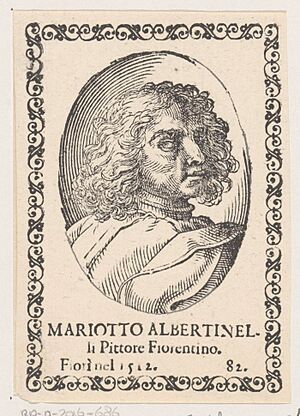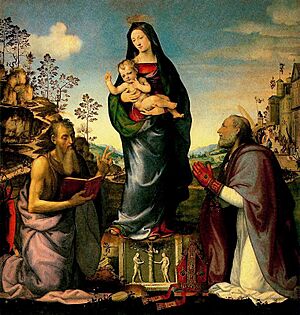Mariotto Albertinelli facts for kids
Quick facts for kids
Mariotto Albertinelli
|
|
|---|---|
 |
|
| Born | 13 October 1474 Florence |
| Died | 5 November 1515 Florence |
| Occupation | Painter |
Mariotto Albertinelli (born October 13, 1474 – died November 5, 1515) was a talented Italian Renaissance painter. He lived and worked in Florence, Italy. He was a good friend and worked closely with another famous painter, Fra Bartolomeo.
Some people describe his paintings as a bit old-fashioned, while others see them as perfect examples of the grand and classic style of the High Renaissance art period.
Contents
Early Life and Training
Mariotto Albertinelli was born in Florence. His father worked as a goldbeater, which means he made thin sheets of gold. Mariotto became a student of the artist Cosimo Rosselli.
In Rosselli's art studio, Mariotto met Baccio della Porta. Baccio later became known as Fra Bartolomeo. The two artists became very close friends.
A Special Partnership
In 1494, Mariotto and Fra Bartolomeo decided to start a "compagnia," or partnership. They shared an art studio and divided the money they earned from their paintings. This partnership lasted until the year 1500.
At that time, Fra Bartolomeo joined the Dominican religious order. He spent two years living quietly in a monastery.
Early Paintings and Influences
Early in his career, Mariotto Albertinelli was hired by Alfonsina Orsini. She was the wife of a powerful leader, Piero II de’ Medici.
His paintings from this time were usually small. They showed very fine details and a delicate style. He was influenced by other artists like Piero di Cosimo, Lorenzo di Credi, and Perugino. Like many artists in Florence, Albertinelli also learned from Flemish painting styles.
Notable Early Works
Some of Albertinelli's first important paintings include:
- A small triptych (a painting with three panels) called Madonna and Child with Saints Catherine and Barbara (1500). You can see it at the Museo Poldi Pezzoli in Milan.
- Another triptych of the Madonna and Child with Saints, Angels, and Religious Scenes. This one is at the Musée des Beaux-Arts in Chartres.
He also painted several panels showing Scenes from Genesis. These are now in different museums around the world, like the Courtauld Gallery in London and the Harvard Art Museums in Cambridge.
The High Renaissance Style
In 1503, Albertinelli finished one of his most famous works. It was a large altarpiece for a chapel in Florence. This painting is now in the Uffizi Gallery.
The main part of this artwork shows the Visitation. This is a scene where Mary visits her cousin Elizabeth. The lower part, called the predella, shows the Annunciation, Nativity, and Circumcision of Christ.
This painting is a great example of High Renaissance art. It uses a pyramid shape for the people in the painting. It also has classic-looking buildings in the background and strong contrasts of light and dark.
Later Partnerships
In 1503, Albertinelli started a new partnership with another artist named Giuliano Bugiardini. This lasted until 1509. Then, Albertinelli teamed up with Fra Bartolomeo again.
During this time, Fra Bartolomeo and Albertinelli painted in similar styles. They even worked together on some pieces. For example, the Kress Tondo is now in the Columbia Museum of Art. It was once thought to be by Fra Bartolomeo, but now experts believe Albertinelli painted it using Fra Bartolomeo's design (called a cartoon).
The Annunciation painting at the Musée d'Art et d'Histoire in Geneva is signed and dated 1511 by both artists. This shows they worked on it together. Their second partnership ended in January 1513.
Personal Life and Legacy
According to a famous writer named Giorgio Vasari, Mariotto Albertinelli enjoyed life and was very social. He sometimes had money problems and even ran a tavern (a type of inn) to earn extra income.
In 1506, he married his wife, Antonia. She helped him manage some of his financial matters. Mariotto Albertinelli taught many students who later became famous artists themselves. These included Franciabigio, Jacopo da Pontormo, and Innocenzo da Imola.
See also
 In Spanish: Mariotto Albertinelli para niños
In Spanish: Mariotto Albertinelli para niños
 | Stephanie Wilson |
 | Charles Bolden |
 | Ronald McNair |
 | Frederick D. Gregory |



